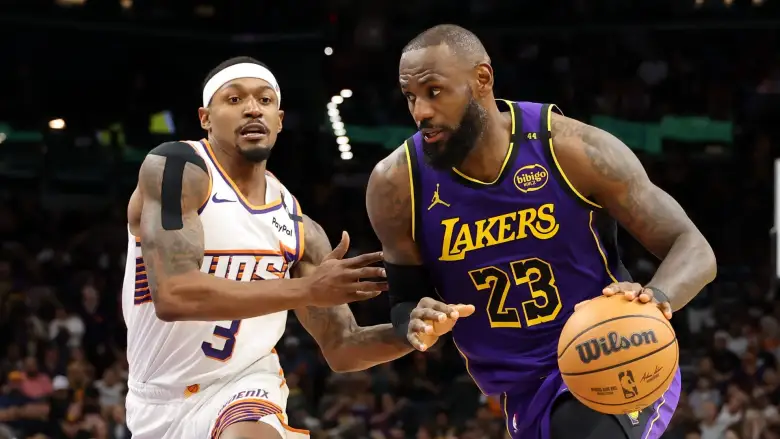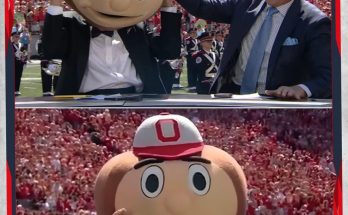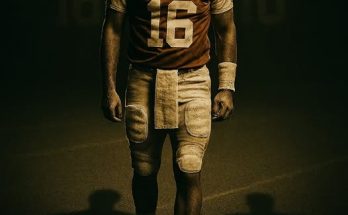Bradley Beal has long been one of the NBA’s most talented and efficient scoring guards, known for his versatility, shot creation, and smooth offensive game. Over the years, many teams have had their eyes on him, especially franchises looking for a third star to complement an already elite duo. Among those, the Los Angeles Lakers have repeatedly surfaced in trade and free agency rumors. Pairing Beal with LeBron James and Anthony Davis felt like an obvious championship recipe on paper. Yet, despite numerous opportunities and rumors, Beal never ended up in the purple and gold. Recently, an insider has shed light on the real reasons why Bradley Beal ultimately rejected the Lakers, providing fans with the behind-the-scenes dynamics of NBA decisions that are often far more nuanced than they appear.
For many fans, it’s difficult to understand why a player would turn down the glamour of the Lakers, a team with a global brand, championship pedigree, and a culture centered around winning. The idea of playing in Los Angeles, in front of packed arenas and Hollywood celebrities, under the lights of Crypto.com Arena, would seem like a dream for most athletes. And in Beal’s case, joining LeBron and AD would have presumably given him the best chance to contend for a title. But the truth is, NBA players today are increasingly making career decisions based not just on basketball or brand appeal, but on family priorities, locker room fit, financial security, long-term role stability, and personal autonomy.
The insider report that finally explained Beal’s reasoning painted a multidimensional picture. One of the first reasons Beal rejected the Lakers was rooted in concerns about role clarity and usage. In Washington, Beal had grown accustomed to being the number one option, the offensive centerpiece, and the go-to guy in crunch time. While he had expressed interest in competing for a title and perhaps sharing the spotlight, the move to the Lakers would have required him to take a significant step back in terms of ball handling and decision-making.
With LeBron James still playing at a high level even in his 40s, the Lakers offense continues to revolve around his playmaking. Anthony Davis commands touches in the post and needs the offense to funnel through him at times. A player like Beal, who thrives with the ball in his hands and benefits from rhythm, would have had to adapt to a less ball-dominant role. According to the insider, Beal and his camp were concerned that he would end up being a glorified spot-up shooter in L.A., reduced to standing in the corner while LeBron and AD orchestrated the offense. For a player of Beal’s caliber and skillset, that was not an appealing proposition.
Another factor was the Lakers’ organizational instability. Over the past several seasons, Los Angeles has undergone frequent coaching changes, roster overhauls, and front office inconsistencies. While the Lakers did win the 2020 NBA Championship, they have not demonstrated consistent long-term planning since. From Frank Vogel to Darvin Ham, and from Russell Westbrook’s chaotic tenure to constant trade rumors surrounding almost every role player, the team has lacked continuity. For a veteran like Beal, who had spent over a decade in Washington dealing with instability, moving to another organization with similar turbulence was not appealing.
The insider also noted that Beal’s family played a major role in the decision. Players often weigh lifestyle, family environment, and community support heavily when making major career moves. Beal’s wife and children had settled in their community, and moving to Los Angeles would have meant uprooting them to a city known for its high cost of living, traffic, and relentless media scrutiny. While L.A. has its benefits, it’s not always the ideal fit for every NBA family, particularly one that values privacy and consistency. Beal, by many accounts, is a family-oriented man who prioritizes stability for his wife and kids, even over championship pursuits.
Another point worth noting is Beal’s desire for a fresh start that didn’t feel forced. When he left Washington, he wanted a team where he would be not just a contributor, but a cornerstone. He ended up choosing the Phoenix Suns, where he could join forces with Devin Booker and Kevin Durant under a management structure that pitched him on a vision of fluid offense, shared leadership, and an organizational culture that aimed to be player-centric. The Suns didn’t just offer a big market; they offered Beal a seat at the table. According to the insider, Phoenix was very specific in telling Beal that he wouldn’t be a third wheel, but a third head on a three-headed dragon—equal in say, in impact, and in responsibility.
This stood in contrast to what the Lakers were offering. While there was mutual interest, the Lakers’ pitch was reportedly less defined. According to the insider, there was hesitancy within the Lakers front office about how Beal’s contract—worth over \$200 million—would impact the salary cap and future flexibility. That hesitancy may have been sensed by Beal, who didn’t want to be somewhere he wasn’t fully prioritized. While Lakers fans saw a potential Big Three, Beal may have seen a situation where he would always be LeBron’s sidekick and possibly expendable down the line. His no-trade clause gave him unique leverage to pick his destination, and he wanted to use it to go somewhere he felt truly wanted.
Money, of course, also plays a role in every NBA decision, and the Lakers simply weren’t in the best position financially to absorb Beal’s max contract without gutting their depth. A trade for Beal would have likely required parting with multiple rotation pieces and draft capital, putting the Lakers’ future in a precarious situation. Beal is smart enough to understand that joining a top-heavy team with little bench depth is not always a path to winning. The Suns, on the other hand, had a plan to build a deeper roster around him, even while taking on his contract.
There was also the issue of pressure and narrative. Playing for the Lakers comes with the heaviest spotlight in basketball. Every game, every quote, every misstep is magnified by national media. For someone like Beal, who had spent most of his career in the relative anonymity of Washington, a sudden jump to L.A. would have meant adjusting to daily scrutiny. And while some stars thrive in that environment, others find it distracting or exhausting. According to the insider, Beal’s team considered the Lakers’ media circus a potential hindrance to his game and peace of mind. He wanted to win, yes, but he also wanted to enjoy basketball again. The joy of the game matters, especially to someone who had given everything to a franchise like Washington only to never truly contend.
Beal’s rejection of the Lakers can also be seen as part of a broader trend in the NBA, where players are increasingly empowered to choose their own path rather than follow legacy destinations. In past decades, teams like the Lakers, Celtics, and Knicks were viewed as ultimate end goals. Today, players care more about fit, flexibility, ownership vision, and off-court fulfillment. The Lakers’ mystique, while still powerful, doesn’t automatically override those other factors anymore. Beal’s decision is a modern-day example of that shift.
From a basketball perspective, there’s also reason to believe Beal simply preferred the Suns’ on-court situation. Playing next to Devin Booker, who is one of the league’s best combo guards, and Kevin Durant, a versatile scorer and forward who doesn’t need the ball to dominate, provides Beal with a unique opportunity to shine without sacrificing his identity. In Phoenix, the offensive structure gives him more freedom to create, score, and even lead the team when needed. Beal can play on or off the ball, take over games in spurts, and doesn’t have to defer every possession. The insider emphasized that Phoenix’s system was a better match for Beal’s game than what the Lakers could offer.
Another underestimated aspect is Beal’s long-standing relationship with players and coaches around the league. He reportedly had existing rapport with some members of the Suns’ staff and front office, which helped tip the scale in their favor. Trust and relationships matter. When Beal weighed his options, it wasn’t just about the court. It was about who he could trust to manage his career properly, and where he would feel valued beyond his stats.
The decision also reflects a broader commentary on how player empowerment has changed team-building in the NBA. With the introduction of no-trade clauses, player options, and supermax deals, stars now have the final say more than ever before. Beal exercised that power not just to move, but to control the conditions of his move. He didn’t simply wait for a team to acquire him. He vetted teams. He weighed every aspect of what life would be like in each destination—on the court, at home, in the locker room, and in the media. That kind of intentionality is what defines the modern superstar, and Beal’s rejection of the Lakers underscores how far we’ve come from the old narrative of “join the biggest brand, win titles, ride off into the sunset.”
Fans who hoped to see Beal in a Lakers jersey might be disappointed, but understanding his decision through a human lens helps make sense of it. Basketball is a game, yes, but for these players, it’s also a life. Choosing where to work, where to raise your family, and how to spend your final prime years isn’t something anyone takes lightly. Beal’s move wasn’t a snub to the Lakers—it was a statement about knowing your worth, choosing fit over flash, and prioritizing personal values over public perception.
In hindsight, Beal’s decision might be validated or questioned depending on how the next few seasons unfold. If the Suns win a title and Beal plays a crucial role, his choice will be lauded as visionary. If the Lakers rise and Phoenix stumbles, critics will inevitably question what might have been. But that’s the nature of sports narratives—they shift with the outcomes. What doesn’t change, however, is the process behind Beal’s thinking: a process that reminds fans and analysts alike that every NBA player is also a person with priorities, boundaries, and dreams that go beyond the box score.
By walking away from the Lakers’ offer, Bradley Beal didn’t just shape his own future—he reinforced a growing movement in the NBA that puts player empowerment and thoughtful decision-making at the center of the sport. And as the league continues to evolve, his decision might become the blueprint for future stars navigating the crossroads of legacy, lifestyle, and leverage.



